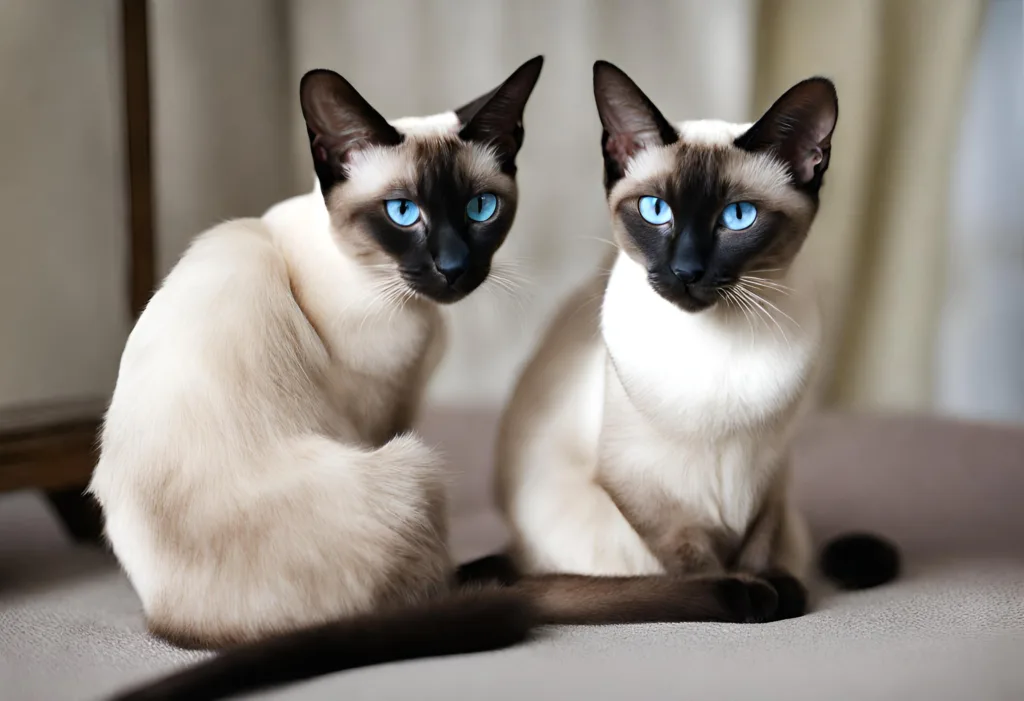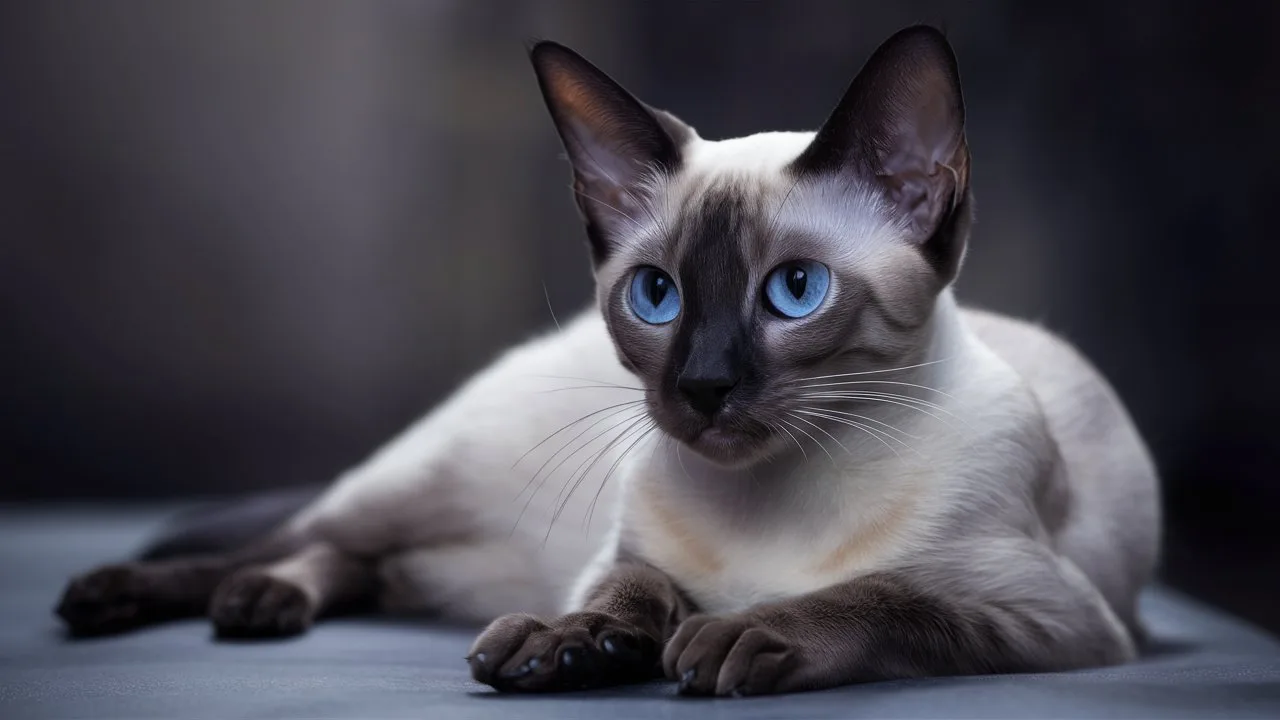The captivating charm of Siamese cats, with their mesmerizing blue eyes and elegant builds, transcends generations. These intelligent and vocal felines become cherished members of the family, showering their owners with affection and amusement. But as with all beloved companions, time inevitably marches on. This article delves into the world of Siamese cat aging and longevity, equipping you with the knowledge and tools to understand the aging process and support your feline friend’s well-being in their golden years.
Siamese Cats: Aging Gracefully

Siamese cats are known for their playful personalities and seemingly boundless energy. However, like all creatures, they eventually enter their senior years. Here’s a glimpse into the typical lifespan of Siamese cats and the physical changes they may experience:
- Lifespan: With proper care, Siamese cats can live for 12-15 years.
- Physical Changes: As Siamese cats age, they may become less active, experiencing decreased muscle mass and joint stiffness. Their eyesight and hearing may also diminish. Their once vibrant coat might show signs of greying or thinning.
Understanding these age-related changes is crucial for providing optimal care and ensuring your Siamese cat enjoys a comfortable and fulfilling golden age.
Recognizing the Signs of Aging: Early Detection is Key
While some changes associated with aging are inevitable, others might signal underlying health concerns. Here are some signs to be observant of:
- Decreased Activity Level: A noticeable reduction in playtime or general lethargy can be a sign of aging, but it could also indicate illness.
- Changes in Appetite: A loss of appetite or increased pickiness can be related to aging or dental issues.
- Litter Box Habits: Difficulty using the litter box, increased urination, or accidents outside the litter box can be signs of urinary tract problems or other health concerns.
- Changes in Sleep Patterns: Excessive sleeping or disrupted sleep cycles can be a normal part of aging, but they can also indicate underlying conditions.
- Changes in Appearance: Weight loss, dull or matted fur, or excessive grooming can be signs of health problems.
If you notice any of these signs in your Siamese cat, consult your veterinarian promptly. Early detection and treatment of age-related health issues can significantly improve your cat’s quality of life.
Tailoring Care for Senior Siamese Cats: A Recipe for Longevity
By adapting your care approach, you can significantly contribute to your senior Siamese cat’s well-being and longevity. Here are some key considerations:
- Nutrition: Senior Siamese cats may require a diet formulated for older cats, often containing higher protein content and easier digestibility. Consult your veterinarian to determine the best dietary plan for your cat’s specific needs.
- Weight Management: Maintaining a healthy weight is crucial for senior cats, as obesity can exacerbate joint problems and other health issues.
- Veterinary Care: Schedule regular checkups with your veterinarian, ideally more frequently as your cat ages. These visits allow for early detection and management of age-related health problems.
- Dental Care: Regular dental cleanings become even more important for senior cats to prevent dental disease and potential pain.
- Enrichment and Exercise: While activity levels may decrease, gentle exercise and mental stimulation remain vital for senior Siamese cats. Provide low-impact play sessions, puzzle feeders, and easily accessible perching spots to keep them engaged.
Creating a Comforting Environment for Your Senior Siamese Cat
As your Siamese cat ages, their needs may change. Here are some tips to create a comfortable and safe environment for your senior feline friend:
- Provide Easy Access: Ensure easy access to litter boxes, food and water bowls, and sleeping areas. Consider placing litter boxes on lower levels and using ramps or steps to access elevated areas.
- Maintain a Consistent Routine: Senior cats thrive on routine. Stick to consistent feeding times, playtime schedules, and litter box cleaning routines to provide a sense of security and comfort.
- Offer Soft Bedding: Provide comfortable and easily accessible bedding in quiet areas where your cat can rest peacefully.
- Minimize Stress: Minimize loud noises, sudden changes, and unfamiliar guests to reduce stress on your senior cat.
Common Health Concerns in Senior Siamese Cats: Proactive Care is Essential (continued)
- Hyperthyroidism: This condition can cause weight loss, increased appetite, and excessive thirst. Early diagnosis and treatment are crucial for managing this condition.
- Vision and Hearing Loss: As Siamese cats age, their vision and hearing may deteriorate. Adapt your environment to accommodate these changes by keeping furniture arrangements consistent and using sound to guide them.
FAQs: Navigating the Golden Years with Your Siamese Cat
Q: How can I tell if my Siamese cat is depressed?
A: Signs of depression in senior cats can include social withdrawal, decreased grooming, and a loss of interest in activities they once enjoyed. Consult your veterinarian if you suspect your cat might be depressed.
Q: Is euthanasia ever the right choice for my senior Siamese cat?
A: This is a difficult decision best made in consultation with your veterinarian. Consider your cat’s quality of life and their ability to enjoy basic activities. Saying goodbye is never easy, but euthanasia can be a humane option when your cat is suffering and there are no viable treatment options left.
Q: How can I cope with the loss of my Siamese cat?
A: Losing a beloved pet is a grieving process. Allow yourself time to grieve, cherish the memories you shared with your cat, and consider seeking support from pet loss support groups or a veterinary social worker.
Conclusion: A Commitment to a Lifetime of Love
Siamese cats are captivating companions who bring joy and laughter into our lives. As they age, their needs may change, but the bond of love remains. By understanding the aging process, adapting your care approach, and creating a comfortable environment, you can ensure your senior Siamese cat enjoys a peaceful and fulfilling golden age. Remember, owning a Siamese cat is a lifelong commitment. Embrace the journey, cherish every moment, and provide your feline friend with the love and care they deserve throughout their life.

